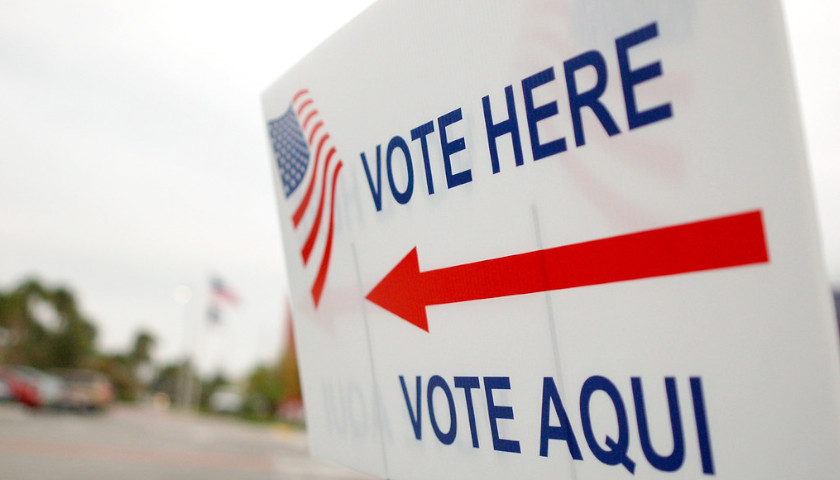by Natalia Mittelstadt
The New York City Council has filed an appeal to the state’s highest court to reverse an intermediate appellate court’s ruling that struck down the city’s law allowing non-citizens to vote in local elections while Washington, D.C., recently had its non-citizens voting law upheld.
Cities are experiencing varying levels of success with their non-citizen voting laws, as New York City’s has been struck down twice in court while D.C.’s has survived an initial challenge.
On Monday, New York City Council filed a notice of appeal to the New York Court of Appeals, the state’s highest court, seeking to have the decisions of two lower courts overturned.
The law was first invalidated in June 2022 by Staten Island Supreme Court Justice Ralph Porzio, who found it violated state election laws holding that only U.S. citizens should be allowed to vote. The ruling prompted Mayor Adams’ administration to file an appeal, but the Supreme Court’s appellate division rejected it last month and upheld Porzio’s decision.
The appeals court ruled that the law “was enacted in violation of the New York State Constitution and Municipal Home Rule Law, and thus, must be declared null and void.”
If the state’s highest court ultimately upholds the law, then as many as 800,000 people could become eligible to vote.
“Empowering New Yorkers to participate in our local democratic process can only strengthen New York City by increasing civic engagement,” a spokesperson for the city council said, according to Politico.
The law is being challenged by a group of Republicans, among them some members of the city council and Staten Island Borough President Vito Fossella. They had specifically alleged that the law could “dilute the votes of United States citizens” and “cause an abrupt and sizeable change to the makeup of the electorate” that would require a change in how they campaigned for office.
Elsewhere, a federal judge has dismissed a legal challenge to a Washington, D.C., law permitting non-citizens to vote in local elections.
The measure further applies to illegal immigrants and the staff of foreign embassies, according to Fox News. Non-citizens must merely reside in the district for at least 30 days and be otherwise qualified to vote to be eligible.
Judge Amy Berman Jackson last Thursday dismissed the challenge from the Immigration Reform Law Institute, asserting that the plaintiffs lacked standing to challenge the measure.
While some localities are looking to allow non-citizens to vote, some states are working to prevent non-citizens from voting. After the Kentucky state legislature passed a constitutional amendment this month to prevent non-citizens from voting in local elections, voters will be able to decide in the November election whether to ratify it.
The Georgia state House also considered a constitutional amendment that would prohibit non-citizens from voting but the proposal failed last month.
“The border crisis and the Administration’s failure to act makes it necessary for Georgia to take swift action,” Georgia Secretary of State Brad Raffensperger said in February. “Multiple organizations with ties to Democrats are currently suing to end critical citizenship verification in our registration process, potentially exposing our elections to foreign interference, and diluting the power of legally registered voters.”
He added that his “office is leading the charge to defend Georgia’s citizenship verification law and pass legislation to close any loopholes and ensure that only American citizens are voting in our elections.”
Although non-citizens are prohibited from voting in federal, state, and most local elections, three states and Washington, D.C., allow non-citizens to vote in local elections. The three states are California, Maryland, and Vermont.
Across the three states and the District of Columbia, 17 municipalities allow non-citizens to vote in local elections. Thirteen of those 17 municipalities allow illegal immigrants to vote.
Meanwhile, seven states have specified that non-citizens aren’t allowed to vote in state and local elections: Alabama, Arizona, Colorado, Florida, Louisiana, North Dakota, and Ohio.
Arizona has bifurcated elections, in which residents who provide proof of U.S. citizenship can vote in all elections while the rest may vote only in federal elections, resulting in ballots cast by voters who haven’t proven their U.S. citizenship.
At least around 5,800 federal-only ballots were cast in the November 2020 presidential election in Arizona.
The Supreme Court ruled in 2013 that Arizona must accept U.S. voter registration forms because of federal requirements under the 1993 National Voter Registration Act (NVRA). Federal voter registration forms require those filling them out only to sign a sworn declaration that they are U.S. citizens.
In January, the Honest Elections Project released a report with 14 recommended election reforms that states should adopt to ensure the integrity of their elections. One of these reforms is to “[b]an non-citizen voting in all elections.”
“American elections should be decided by American citizens, but a growing number of cities including New York City and Washington, D.C., are responding to liberal pressure and working to enfranchise non-citizens and illegal aliens,” the report reads.
The recommended reform reads, “Most state constitutions grant voting rights to ‘every’ citizen, open-ended language that liberal activists argue permits localities to authorize non-citizen and even illegal alien voting. States should amend their constitutions to instead permit ‘only’ citizens may vote.”
– – –
Natalia Mittelstadt graduated from Regent University with Bachelor of Arts degrees in Communication Studies and Government.
Photo “Vote Here Sign” by Erik (HASH) Hersman. CC BY 2.0.








